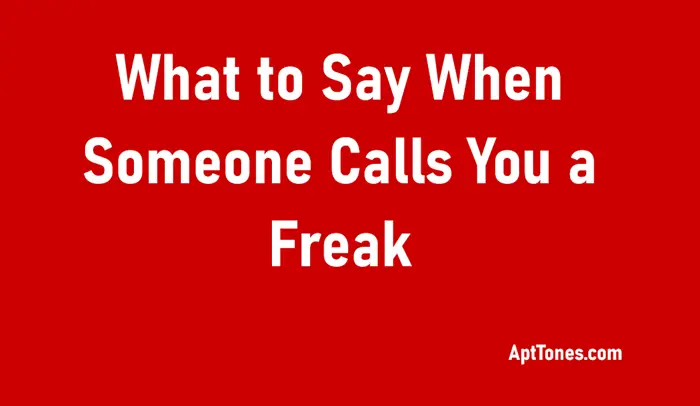Response 3: The Humorous Deflection
“If being a freak means being unique, then I guess I’m happy to be one!”
Humor can be a great tool to defuse tension. This response is best used in casual settings or when you know the person well enough to use humor effectively.
Response 4: Addressing the Underlying Issue
“It seems like you’re upset with me. Let’s talk about what’s really bothering you, rather than resorting to name-calling.”
This is a good response when you sense the name-calling stems from a deeper issue. It’s helpful in personal relationships or situations where there’s a need for ongoing interaction.
Response 5: The Direct Challenge
“Calling me a freak isn’t helpful or productive. Let’s focus on constructive communication.”
Choose this response to directly address the inappropriateness of the comment, especially in a professional or serious context.
Response 6: The Reflective Reply
“I’m always open to feedback, but I believe that respect is important in any conversation. Let’s keep it respectful.”
This reply is suitable when you want to indicate that you are open to constructive criticism but not to disrespectful labels.
Response 7: The Silent Treatment
… (remain silent, giving a non-verbal cue of disapproval)
Sometimes, silence can be a powerful response. This is best used when you believe that any verbal response might escalate the situation.
Response 8: Setting Boundaries
“I need to be treated with respect in our interactions. Please refrain from using derogatory terms like ‘freak’.”
Use this response to establish clear boundaries about acceptable communication, especially important in personal and professional relationships.
Response 9: The Diplomatic Approach
“I understand we might have different views, but I believe we can express them without resorting to name-calling.”
This is an effective response when you aim to de-escalate a situation and promote a more respectful dialogue.
Response 10: Affirming Self-Worth
“I’m comfortable with who I am and don’t find the term ‘freak’ applicable or appropriate to describe me.”
This response is for moments when you need to affirm your self-esteem and reject the label in a calm manner.
Response 11: Questioning the Intent
“Do you really believe what you’re saying, or are you just trying to provoke a reaction?”
This is useful when you suspect the person is trying to get a rise out of you and encourages them to reflect on their intentions.
Response 12: Redirecting the Focus
“Let’s concentrate on the topic at hand rather than on personal labels.”
Use this to bring the conversation back to the main issue, particularly in a debate or discussion that has become personal.
Response 13: The Socratic Method
“What do you think calling someone a freak achieves?”
This response prompts the speaker to reflect on the effectiveness and implications of their words, encouraging a more thoughtful conversation.
Response 14: Offering a Different Perspective
“Everyone has their unique qualities. I choose to see diversity as a strength, not a reason for labels.”
This is an effective response in situations where you want to promote a more inclusive and understanding viewpoint.
Response 15: The Reality Check
“I believe your perception is based on a misunderstanding. I’m open to discussing this if you are.”
Suitable when someone is labeling you based on a misconception or a one-time incident.
Response 16: The Professional Stance
“In a professional setting, I expect and provide respect. Let’s keep our discussion focused and respectful.”
Tailored for workplace interactions where maintaining a professional demeanor is crucial.
Response 17: Inviting Empathy
“How would you feel if someone called you a freak? It’s important to consider the impact of our words on others.”
This response invites the other person to empathize by considering their own feelings if the roles were reversed.
Response 18: Acknowledging Hurt
“Your words are hurtful, but I choose not to take them to heart. I know my value.”
This reply shows vulnerability while also demonstrating emotional strength and self-confidence.
Response 19: Embracing the Label
“If being different makes me a freak, then I embrace that. Diversity is what makes life interesting.”
This response turns the label on its head, embracing the idea of being different as a positive trait.
Response 20: The Graceful Exit
“I don’t think this conversation is constructive. Let’s talk again when we can have a respectful dialogue.”
Sometimes, the best response is to remove yourself from a negative conversation, especially when it’s becoming unproductive or disrespectful.
Wrap-up
In each of these responses, the key is to maintain your composure and self-respect. Your response should be guided by the situation, your relationship with the person, and what you’re trying to achieve in the interaction. The goal is to respond in a way that upholds your dignity and fosters constructive communication.
